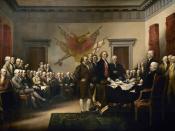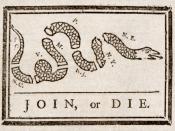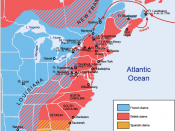The revolutionary war was a fine example of unity and a great sense of identity. During, the revolutionary era there were many examples of colonial unity as a group and as a soon to be country. The strength of the revolution was dependent on their unity. The colonists had a strong sense identity and unity by the eve of the revolutionary war.
The identity of the colonists was showed in many ways throughout history. The colonists wanted to be a separate entity from their mother country, England. The identity of the colonists was shown in a speech to parliament by Edmund Burke. He wrote about the colonies as a separate place far from England. Burke wrote:
Govern America as you govern an English town which happens not to be represented in parliament...Is there a single trait of resemblance between those few towns and a great and growing people spread over a vast quarter of the globe, separated from us by a mighty Ocean? (Burke,1).
This was example the identity of the colonies, because Burke said the English rule cannot have effect on America. He also said that England cant rule the colonists because of the difference of culture and way of life. They were really a separate country.
There were many examples of unity in pre-revolution events. After the Intolerable acts were put into action, the colonists rebelled against the king and started the Continental Congress. The Navigation acts were another example of unity because they defied the king and stood up for what they believed in. The pamphlet Common Sense, by Thomas Paine, helped unify the colonists through its ideas of a new republic. Printed articles such as news, books and events like the Boston Massacre helped the colonists unify through propaganda. The French and Indian war was...


